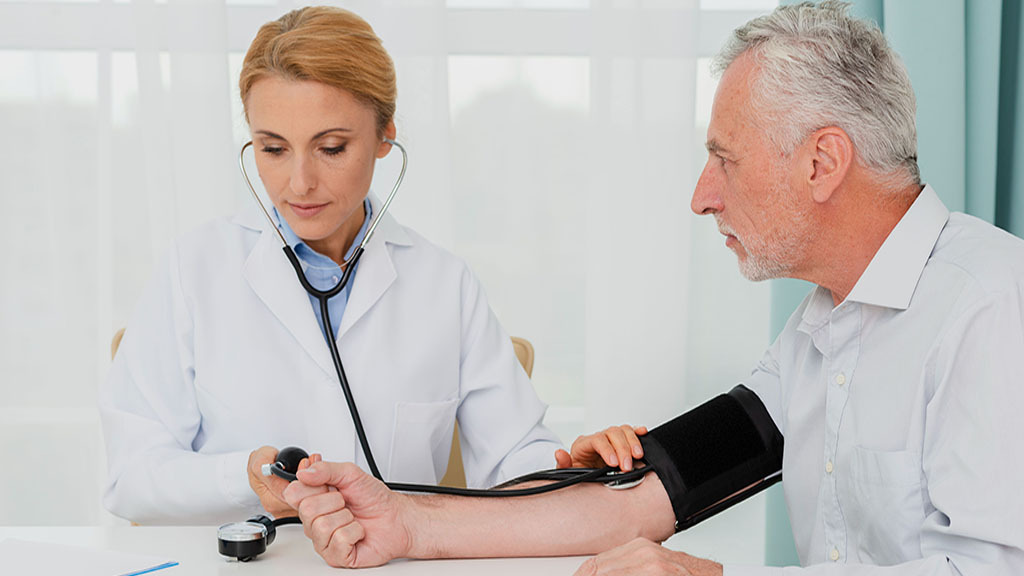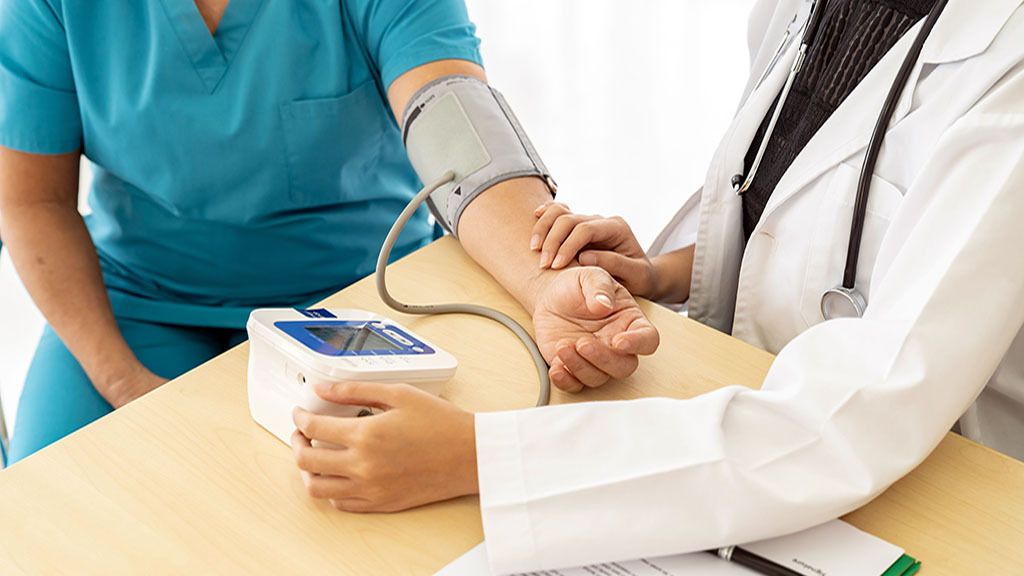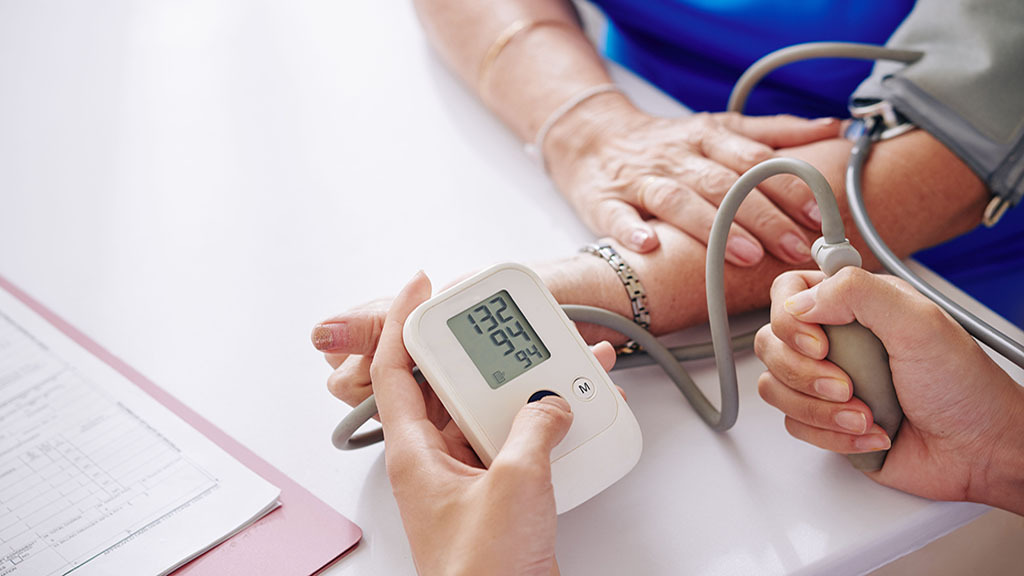
Blood Pressure Monitoring Service
You can schedule an appointment for our Blood Pressure Monitoring Service, and we offer next-day appointments for your convenience at one of our branches.
Blood Pressure Monitoring ServiceNext-day appointments available
Book an appointment at one of our branches for next-day service.
Understanding High Blood Pressure
Cardiovascular disease (CVD) is a leading cause of premature mortality in England, affecting seven million people and accounting for 1.6 million disability-adjusted life years. High Blood Pressure is often referred to as the ‘silent killer’ because it may not exhibit symptoms until it’s too late. It stands as the most significant risk factor for CVD, impacting one in four adults, and ranks among the top five risk factors for premature death and disability in England. An estimated 5.5 million people across the country have undiagnosed hypertension.
Regular monitoring of your blood pressure is crucial, as untreated high blood pressure can lead to severe health complications.
Free NHS Blood Pressure Monitoring Service
Free NHS Blood Pressure Monitoring Service
This service is designed to:
- Identify individuals aged 40 years or older with high blood pressure (who have not previously received a confirmed hypertension diagnosis) and refer them to a general practice for diagnosis confirmation and appropriate management.
- Conduct ad hoc clinic and ambulatory blood pressure measurements as requested by GP practices.
- Offer an additional opportunity to promote healthy lifestyles to patients.
Eligibility for the Free NHS Blood Pressure Monitoring Service
This free service is available to:
- Adults aged 40 years or older who do not have a current hypertension diagnosis.
- Patients under the age of 40, at the pharmacist’s discretion, who request the service due to a known family history of hypertension.
- Patients aged 35 to 39, at the pharmacist’s discretion, who are approached about or request the service.
- Adults identified by a GP practice for blood pressure measurement.
Service Options
The free NHS Blood Pressure Monitoring Service is available for:
- Adults aged 40 years or older who do not have a current hypertension diagnosis.
- Patients under the age of 40, at the pharmacist’s discretion, who request the service due to a known family history of hypertension.
- Patients aged 35 to 39, at the pharmacist’s discretion, who are approached about or request the service.
- Adults specified by a GP practice for blood pressure measurement.
Clinic Blood Pressure Check – NHS
Free
This service aims to identify people with high blood pressure aged 40 years or older (who have previously not had a confirmed diagnosis of hypertension) and refer them to general practice to confirm the diagnosis and for appropriate management.
Clinic Blood Pressure Check – Private
£9.99 per patient
Suppose you are not eligible for the free NHS Blood Pressure Monitoring Service. You can take advantage of the Private Blood Pressure Monitoring Service at your local Midway Pharmacy.
Book Now
High blood pressure is medically known as hypertension. It means your blood pressure is consistently too high, and your heart has to work harder to pump blood around your body. High blood pressure is severe. Ignoring it can lead to heart and circulatory diseases like a heart attack or stroke. It can also cause kidney failure, heart failure, vision problems and vascular dementia.
Blood pressure machines vary, but they’re all measuring devices, often with an arm cuff attached to them. The cuff is usually wrapped around your upper arm and filled with air until it feels tight. This can feel uncomfortable, but it only lasts a few seconds.
There isn’t always an explanation for the cause of high blood pressure, but most people develop high blood pressure because of their diet, lifestyle or medical condition.
Sometimes high blood pressure runs in families and can also worsen with age. People living in deprived areas are at higher risk of high blood pressure, which is also more common if you are of African or Caribbean descent. Even in these cases, you may still be able to improve your blood pressure by changing your diet and being active.
High blood pressure rarely has noticeable symptoms. The following can be symptoms of high blood pressure:
- Blurred vision
- Nosebleeds
- Shortness of breath
- Chest pain
- Dizziness
- Headaches
Yes, the following are examples of lifestyle changes that can help reduce high blood pressure:
reduce the amount of salt you eat and have a generally healthy diet
- Cut back on alcohol
- Lose weight if you’re overweight
- Exercise regularly
- Cut down on caffeine
- Stop smoking
Some people with high blood pressure may also need to take one or more medicines to stop their blood pressure from getting too high
High blood pressure can often be prevented or reduced by eating healthily, maintaining a healthy weight, exercising regularly, drinking alcohol in moderation and not smoking.
Doctors can help you keep your blood pressure at a safe level using either lifestyle changes or medicines. What works best is different for each person.
Talk to your doctor to help you decide about treatment.
Where can I get my blood pressure measured or tested?
This service is available in our branches, which are commutable from anywhere in Yorkshire, including Leeds, Bradford, Wakefield, York, Huddersfield, Sheffield, Barnsley, Hull, Doncaster, Ripon, Harrogate, Dewsbury, Keighley and Scarborough.
Yes, you can get next-day appointments at all our branches. Contact our customer care team if you cannot find an available slot.
Next-day appointments are available at our branches.
Book Service


